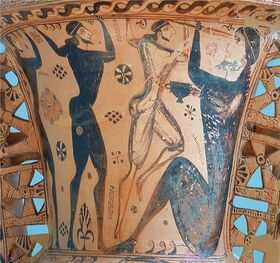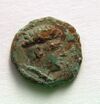Biology:List of rulers in Illyria
This is a list of rulers in Illyria, a region of classical antiquity in what is today the Western Balkans. The region was inhabited by loosely related tribes that often were part of larger tribal conglomerations like the Dalmatae. In the late 5th and the early 4th century BC, the first polities of the area would be created as exemplified by Bardylis's Dardanian kingdom. In the course of the 4th century parts of the southernmost and easternmost regions of Illyria fell under the Kingdom of Macedon. The most powerful state of the area, the Ardiaean kingdom, emerged in the 3rd century BC during the rule of Agron and Teuta. It was defeated and conquered by the Roman Republic, which maintained a system of direct rule and client states before the final incorporation of the area into the Roman state after the Third Illyrian War.
Mythological rulers

- Lycotherses: king of Illyria and husband of Agave from Thebes.[1]
- Cadmus: helped the Enchelae against the other Illyrians around Lynkestis.[2]
- Harmonia: consort of the Phoenician Cadmus; later turned into a serpent with her husband by her grandfather Zeus.[3]
- Hyllus: the son of the Greek demigod Heracles, was claimed to be the earliest Illyrian king.
- Epidamnus: founded and ruled Epidamnos.[4]
- Heracles: ruled a share of Dyrrhachus' territory after aiding him in battle.[4]
- Ionius: mythological/historical ruler of Issa; son of Dyrrhachus, eponym of the Ionian Sea.[1]
- Pyraechmes: leader of the Paeonians in the Trojan War.[5]
- Asteropaios: second leader of the Trojan-allied Peonians; killed by Achilles.[6]
- Polyphemus: one-eyed giant; later version of the Greek myth holds him as the father of Illyrius.[7]
- Galatea: consort of Polyphemus.[7]
- Illyrius: ruled Illyria and became the eponymous ancestor of the Illyrians; son of Cadmus or Polyphemus.[8] Illyrius had six sons and three daughters whose names were associated with specific tribes:
Sons
- Encheleus of the Enchelae
- Autarieus of the Autariatae
- Dardanus of the Dardani
- Maedus of the Maedes
- Taulas of the Taulantii
- Perrhaebus of the Perrhaebi
Daughters
- Partho of the Partheni
- Daortho of the Daors
- Dassaro of the Dassaretae
Grandsons
- Pannonius or Paeon (son of Autarieus) of the Pannonians or Paeonians
Great-grandsons
- Scordiscus (son of Pannonius) of the Scordisci
- Triballus (son of Pannonius) of the Triballi
Major rulers
- Sirras (437–390 BC), ruler of the Taulantii, challenged Macedonia in 423 BC.[9]
- Bardylis (448–358 BC), king of the Dardani and perhaps the founder of the Dardanian State. Macedonian campaigns proved successful in 393, 372 and 359 BC; invaded Epirus in alliance with Dionysius of Syracuse.[10]
- Grabos, king of the Grabaei (r. 358–356 BC): entered Athenian alliance to resist Philips power in 356 BC.
- Pleuratus I, king of the Taulantii (r. 356–335 BC): in a losing effort in 344 BC, tried to thwart Philip's advances in Illyria.[11]
- Cleitus, king of the Dardani (r. 335–295 BC): mastermind behind the Illyrian Revolt of 335 BC against Alexander the Great.[12]
- Bardyllis II, king of the Dardani (r. 295–290 BC): managed to re-create the state of his grandfather in the region of Dassaretae to the west of the Lynkestian lakes.[13]
- Monunius I, king of the Dardani (r. 290–270 BC): reigned during the Gallic invasions of 279 BC.[14]
- Mytilus, possible king of the Dardani or chieftain of Dyrrachium (r. 270–?): waged war on Epirus in 270 BC.[14]
Ardiaean rulers
- Pleuratus II: reigned in a time of peace and prosperity for the Illyrian kingdom.,[15] ruled BC 260 ~ BC 250
- Agron: in 231 BC, possessed the most powerful land army and navy, of any of the kings who had reigned before him; extended the kingdoms borders in the north and south.,[16] ruled B.C 250~B.C 230
- Teuta (regent for Pinnes): forced to come to terms with the Romans in 227 BC.[17]
- Demetrius of Pharos: surrenders to the Romans at Pharos in 218 BC and flees to Macedonia.,[18] ruled B.C 222~B.C 219
- Scerdilaidas: allied with Rome to defeat Macedonia in 208 BC.,[19] ruled B.C 218~B.C 206
- Pinnes: too young to become king; ruled under the regency of Teuta, Demetrius and Scerdilaidas.,[20] ruled B.C 230~B.C 217
- Pleuratus III: rewarded by the Romans in 196 BC, with lands annexed by the Macedonians.,[21] ruled B.C 205~B.C 181
- Gentius: defeated by the Romans in 168 BC during the Third Illyrian War; Illyrian kingdom ceased to exist while the king was taken prisoner.,[22] ruled B.C 181~B.C 168
Dardanian rulers
- Longarus: invaded northern borders of the Illyrian kingdom in 229 BC while Teuta was dealing with campaigns in Epirus.[23]
- Bato of Dardania: clashed with Macedonia in 199 BC, in order to liberate Paeonia.[24]
- Monunius II of Dardania: repelled the Bastarnae Invasion of Dardania in 175 BC.[25]
Taulantian rulers
- Galaurus: unsuccessfully invaded Macedonia between 678–640 BC.[26]
- Glaucias: mentioned as a Taulantii king in 335 BC who aided Cleitus at the Battle of Pelion.[27]
Other rulers
- Autariate
- Pleurias, ruler of the Autariate: campaigned against Macedonia during 337/5 BC; one of the last Autariatae kings.[28]
- Histria
- Epulon, ruler of Histria: thwarted Roman advances in the Istrian peninsula until his death in 177 BC.[29]
- Dalmatae
- Verzo, ruler of the Dalmatae: took the city of Promona from the Liburni in order to ambush Octavian in 34 BC.[30]
- Testimos, ruler of the Dalmatae: defeated by the Romans in 33 BC; Dalmatia incorporated into Roman Republic.[30]
- Messapia
- Opis, ruler of Messapia: attacked by Taras in 460 BC at Hyria, in which he died.[31]
- Artas, ruler of Messapia: supplied the Athenians with one hundred and fifty javelin-throwers in 413 BC for the war against Syracuse.[32]
- Breuci
- Bato of the Breuci: surrendered to Tiberius in 8 AD on the bank of the Bosna river.[33]
- Pannonia
- Pinnes of Pannonia: led Pannonians in the Great Illyrian Revolt from 6 AD.[34]
- Daesitaties
- Bato the Daesitiate: defeated by the Romans in 9 AD during the Great Illyrian Revolt; end of final Illyrian resistance to Roman occupation.[35]
- Minor rulers
- Ionios: ruled over Issa and the surrounding region in the first half of the 4th century BC, probably after the fall of Dionysius of Syracuse in 367 BC.[36]
- Ballaios: ruled over the city of Rhizon and surrounding areas after Roman occupation, until 135 BC.[37]
- Caeria: Illyrian queen who ruled to 344/343BC.
Foreign rulers
Kings of Macedon and Epirus
- Philip II of Macedon: conquered Lynkestis and annexed Macedonian lands in 358 and 344 BC.
- Alexander the Great: retained Phillip's acquisitions and suppressed Illyrian Revolt of 335 BC.
- Cassander: conquered morean colonies in 314 BC and parts of Illyrian coast.
- Antigonus I Monophthalmus: ruled parts of southern and eastern Illyria.
- Demetrius I Poliorcetes: ruled parts of southern and eastern Illyria.
- Antigonus II Gonatas: ruled parts of southern and eastern Illyria.
- Demetrius II Aetolicus: ruled parts of southern and eastern Illyria.
- Antigonus III Doson: ruled parts of southern and eastern Illyria.
- Philip V of Macedon: ruled parts of southern and eastern Illyria.
- Perseus of Macedon: ruled parts of southern and eastern Illyria.
- Pyrrhus: extended his kingdom to southern Illyria in the time of Monunius.
- Alexander II: extended his kingdom to southern Illyria in the time of Mitylus.
See also
| Wikimedia Commons has media related to Illyria & Illyrians. |
- List of ancient tribes in Illyria
- List of ancient cities in Illyria
- Illyrians
References
- ↑ 1.0 1.1 Cadmus and Harmonia in Illyria
- ↑ The Dictionary of Classical Mythology by Pierre Grimal and A. R. Maxwell-Hyslop, ISBN:0-631-20102-5, 1996, p. 230, "Illyrius (Ιλλυριός) The youngest son of Cadmus and Harmonia. He was born during their expedition against the Illyrians..."
- ↑ Grimal & Maxwell-Hyslop 1996, p. 230.
- ↑ 4.0 4.1 Appian(Civil War 2.39)
- ↑ Dictionary of Greek and Roman Biography and Mythology
- ↑ Homer, Iliad 21.140–160
- ↑ 7.0 7.1 Grimal & Maxwell-Hyslop 1996, p. 168.
- ↑ Grimal & Maxwell-Hyslop 1996, p. 230
- ↑ The Illyrians to the Albanians - Neritan Ceka - 2005
- ↑ Harding, Philip. From the End of the Peloponnesian War to the Battle of Ipsus, 1985, p. 93, ISBN:0-521-29949-7. Grabos became the most powerful Illyrian king after the death of Bardylis in 358.
- ↑ The Illyrians by J. J. Wilkes, 1992, ISBN:0-631-19807-5, p. 121, 156, 167, 170-174, 190
- ↑ Wilkes 1995, page 120
- ↑ Plut. Pyrrh. 9.
- ↑ 14.0 14.1 The Illyrians by J. J. Wilkes, 1992, ISBN:0-631-19807-5, p. 129, "No Illyrian production of coins is known before King Monunius struck his coins at Dyrrhachium (see figure 11), followed by Mytilus around ten years later..."
- ↑ Fanula Papazoglu (1965), "Fanula Papazoglou's article, "Les origines et la destinée de l'état Illyrien," p. 143
- ↑ Studies concerning Epirus and Macedonia before Alexander by Nicholas Geoffrey Lemprière Hammond, page 105.
- ↑ Wilkes, J. J. The Illyrians, 1992, p. 120, ISBN:0-631-19807-5, p. 158, "Illyrian success continued when command passed to Agron's widow Teuta, who granted individual ships a licence to universal plunder. In 231 AC the fleet and army attacked Ells and Messenia..."
- ↑ A History of Rome to A.D. 565 - p. 111 by Arthur Edward Romilly Boak, William Gurnee Sinnigen,"The island of Pharos and some adjacent territory in Illyria were given to a Greek adventurer, Demetrius of Pharos"
- ↑ Épire, Illyrie, Macédoine: mélanges offerts au professeur Pierre Cabanes by Danièle Berranger, Pierre Cabanes, Danièle Berranger-Auserve, page 137
- ↑ Wilkes, J. J. The Illyrians, 1992, ISBN:0-631-19807-5, p. 162, "...revival of Illyrian power under Demetrius of Pharos, who had succeeded Teuta and married Triteuta, mother of the infant King Pinnes."
- ↑ The Illyrians by J. J. Wilkes, 1992, ISBN:0-631-19807-5, pages 121, 156, 167, 170-174, 190
- ↑ Wilkes, J. J. The Illyrians, 1992, ISBN:0-631-19807-5, p. 221, "Ardiaei from which intoxicated men were conveyed home by their women who had also participated to the overindulgence of their kings Agron and Gentius..."
- ↑ The Illyrians by J. J. Wilkes, 1992, ISBN:0-631-19807-5, p. 86, "...including the names of Dardanian rulers, Longarus, Bato, Monunius and Etuta, and those on later epitaphs, Epicadus, Scerviaedus, Tuta, Times and Cinna. Other Dardanian names are linked with..."
- ↑ The Illyrians by J. J. Wilkes, 1992, ISBN:0-631-19807-5, p. 85, "The recorded names of Dardanian leader during the Macedonian and the Roman wars, Longarus, Bato..."
- ↑ Polybius 23.10
- ↑ Μιμαλλόνες "imitators of men" Etym. Mag. (587.53) see Hesychius "mimelazein. mimeisthai" "mimelon. homoion"
- ↑ Neritan Ceka: Illlyrian to the Albanians, 2005, Migjeni
- ↑ Hammond, "The Kingdoms in Illyria circa 400-167 BC".
- ↑ Livy 41.11
- ↑ 30.0 30.1 Aleksandar Stipčević: Iliri: povijest, život, kultura, p. 49.
- ↑ Pausanias (10.10.6.)
- ↑ The emergence of state identities in Italy in the first millennium BC, pg.51
- ↑ D. Dzino, Illyricum in Roman Politics 229 BC - AD 68 (Cambridge 2010), pp. 149–153.
- ↑ The Cambridge Ancient History, Vol. 10: The Augustan Empire, 43 BC-AD 69 (Volume 10) by Alan Bowman, Edward Champlin, and Andrew Lintott,1996,page 176: "... Daesitiates was soon matched by rebellion of the Breuci in Pannonia, headed by Pinnes and another Bato. ..."
- ↑ Wilkes, J. J. The Illyrians, 1992, ISBN:0-631-19807-5, p. 216, "Further east the formidable Daesitiates of central Bosnia retained their name. The great rebellion of All 6 had been led by their chief Bato, and their relatively low total of 103 decuriae likely reflects..."
- ↑ Croatia: Aspects of Art, Architecture and Cultural Heritage. 2009-11-24. ISBN 9780711229211. https://books.google.ie/books?id=N1647OyYAqMC&pg=PA25.
- ↑ Épire, Illyrie, Macédoine: mélanges offerts au professeur Pierre Cabanes by Danièle Berranger, Pierre Cabanes,Danièle Berranger-Auserve, page 145



